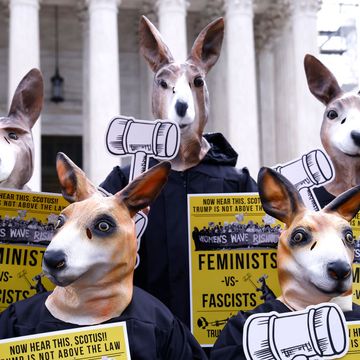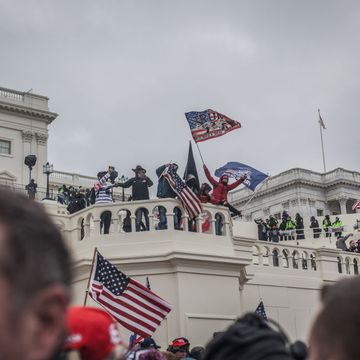UPDATE: The original opening sentence of this piece was widely interpreted as saying that ESPN was set to run a special panel, hosted only by men, which would address the specific subject of domestic violence in the NFL. In fact, we believed the pre-game show was to run as normal, with a segment on domestic violence. We apologize for the confusion that the language of our opening statement created and we have been told that ESPN was not planning to cover this topic in such a format and has covered domestic violence on air before with its female commentators. The first sentence and headline have been amended to reflect this change.
Additionally, we would like to apologize for saying that ESPN is not in the business of journalism. They have produced excellent journalism over the years, such as last year's NFL At a Crossroads: Investigating a Health Crisis.—Kate Lewis, VP, Content Operations & Editorial Director
ESPN has issued a statement in response to this story, as seen below.
On Monday night, during Monday Night Football's two-hour pregame show, I thought it likely that the regular commentators were going to discuss domestic abuse in the NFL. Last week, seven men, but no women, discussed Ray Rice's punishment in the opening block of Monday Night Countdown. Victims of domestic violence in America are most likely to be women aged 20-24.
When the show has updates from the field—brief reports about injuries and the upcoming game—they'll cut to female sideline reporters, Lisa Salters and, on some weeks, Suzy Kolber.
These people are not allowed at the table.
On Monday, you will hear the voices of 11 men tripping over themselves to condemn the actions of one man who knocked his wife unconscious and dragged her motionless body into a casino lobby, and another man who head-butted his wife because she would not have sex with him.
You will hear their beliefs on the commissioner who did not punish Ray Rice appropriately and whose investigation into Rice's domestic violence incident is currently unclear, and might have been intentionally obfuscated or covered up.
But you will not hear these words: "Roger Goodell is a liar."
You will not hear these words because ESPN has a $15.2 billion broadcasting agreement with the NFL. You will not hear these words because it would interfere with the amount of money both ESPN and the NFL can make.
You will not hear these words because ESPN has intimidated its on-air staff into standing down against domestic violence.
Last week, ESPN suspended one of its editors, Bill Simmons, for calling NFL Commissioner Roger Goodell "a liar" and daring his bosses to suspend him for it. They suspended him for it.
Long-tenured editors and personalities of ESPN: It is now time for you to walk out with him.
This is the kind of moment that separates a "journalist" from a "commentator." What do you want to be?
Simmons' suspension at ESPN will last three weeks—one week longer than Ray Rice's initial suspension by Goodell himself. Ray Rice punched his fiancée in the face, knocking her unconscious. Bill Simmons called the head of a corporate interest a liar. His suspension is one of the longest in the history of his company.
Simmons' ascendence is credited to his willingness to say sentences exactly like this. By refusing to wait in line or repeat pabulum and talking points all the way to a potential columnist job later in life, he gained an audience. The network hired Simmons to absorb his growing readership into its offshoot Page 2 section, developing a major success in spite of itself.
Simmons disabused the language of testosterone-soaked talking heads, and it worked. He avoided the intentionally adversarial outrage only created for TV ratings purposes, like the collection of recent controversies by Stephen A. Smith.
Before the second, damning tape in the Ray Rice incident became available, Smith initially attempted to deflect the blame of Ray Rice's domestic incident onto Rice's fiancée, Janay.
Smith had seen Ray Rice dragging a lifeless body out of an elevator and assumed the victim was somehow asking for it.
He was suspended for one week for those comments. Bill Simmons was suspended for three weeks.
Not even six weeks after returning from his suspension, Smith was back on First Take, an ESPN morning debate show, having a partial statement read to him from the National Organization for Women about Roger Goodell and Ray Rice. In the statement, NOW President Terry O'Neill implored Goodell to resign. Exactly 39 seconds after hearing her words for the first time in his life, Smith said that the President for the National Organization for Women had "lost her mind."
It was a temper tantrum. Smith was not suspended. Simmons was suspended for three weeks. ESPN has no affiliation with the National Organization for Women. ESPN has a broadcasting agreement with the NFL until 2021.
Still, this week, ESPN's ombudsman Robert Lipsyte called this "ESPN's finest hour during my tenure."
Last night, Lipsyte defended Simmons' suspension with this sentence: "Bill Simmons has no license to call him (a liar) without more justification than 'I'm just saying it.'"
Six weeks ago, this is how Stephen A. Smith defended advocating for the discussion of "the elements of provocation" that could lead to a man hitting a woman: "I don't think that's broached enough, is all I'm saying."
Bill Simmons was suspended for three weeks. Stephen A. Smith was suspended for one.
In the old boys club of sports media—one with no room for reflection and one that empowers only those who can speak about a base emotion in the fastest and loudest way—Simmons succeeded by writing differently. When his contract expired, Simmons was convinced to stay after ESPN promised him his own outlet, Grantland. The site has since produced thoughtful pieces from different voices—not just retired, bravado-filled athletes or 50-something male anchors who have paid their corporate dues, but also writers who would rather drill deep into statistics, experiment with art and new media, or write contemplatively, creatively and passionately, sometimes under pseudonyms.
Grantland finally allowed for the journalism and opinions of, basically, anyone else.
When female contributors write features for Grantland, they are equal—another voice amidst other smart ideas. Women at Grantland are not cast aside to a separate, less-visited section of their website. That's precisely what happens at ESPN proper, the home of ESPNW—a well-intentioned, largely ignored property at the bottom of ESPN.com, called upon only when "women's issues" affect sports.
This is the kind of tokenism that affected FoxSports.com's Katie Nolan. In August, before the elevator footage of Ray Rice's domestic abuse incident was released, Nolan had the chance to ask Roger Goodell about why he didn't suspend Rice for more games, based on the first video. She didn't. "I'm really going to hear about it from my bosses," she said. "It's really not my role," she said. "I played the role that had been assigned to me," she said.
A month later, she understood this to be a part of a culture of quiet repression. "Women in sports television are allowed to read headlines, patrol sidelines and generally facilitate conversation for their male colleagues," she said. "Sometimes they even let us monitor the Internet from a couch."
She said all of this in a video on FoxSports.com. She ended it with, "I'm ready when you are, Fox."
She was not suspended. She was applauded on the company's website.
And that is the problem with ESPN and the old-wave of sports media: Sports are not now being infiltrated by "women's issues" that demand one-off responses. Women are half the population of the world—and sports are a part of that world.
There are 11 seats at the table at ESPN. All of them go to men. Women get their own table, but only sometimes—and ESPN has placed that table where no one can hear them.
ESPN personalities—even those 11 men—have spent the last two weeks on television defending their position atop a moral high-ground. Each retired player and 60-year-old man has had his chance to spout tough talk about how he would never personally commit or condone domestic violence.
Now that their company is standing behind—as ESPN anchor Keith Olbermann put it—"an enabler of men who beat women" instead of an employee, where have these personalities gone?
They are silent.
Long-tenured editors and personalities of ESPN: Those condemnations mean nothing if you don't stand up for your ideals, your integrity, and the rights of women when your paycheck is on the line.
It means you, too, are just like your bosses: When faced with reporting the truth or collecting a paycheck—even at the most critical moment of your journalistic career—you will take the paycheck.
It means every word spoken about morality from now on is simply just posturing to protect your public image.
It means you are not a journalist. It means you are a commentator, for now and forever.
So stand up. You'd stand for the defining issues of the moment: Corporate entanglement, equal rights, the idea of journalism, and your own integrity.
You would be vindicated in the eyes of history during this very tiresome moment. You would be standing for the truth.













